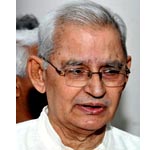Media interference in Investigation and Trial
Justice U L Bhat
29 Jan 2016 6:53 AM IST

Democracy is a way of life; it must maintain human dignity, equality and rule of law. It requires strong public opinion, fearless press and independent judiciary. The importance of free and fearless press cannot be overemphasized. Thomas Jefferson once said:
"Where it is left to me to decide what we should have, a Government without newspapers or newspapers without Government, I should not hesitate to prefer the latter", Freedom of the press, however, is not an end in itself, but it is only a means to an end. Freedom of the press, as any other freedom, is capable of being misused. Freedom of the press is implicit in the constitutional right of freedom of speech and expression guaranteed under Art.19(1)(a) of the Constitution. The right to practise the profession of journalism is also constitutionally guaranteed under Art.19(1)(g) of the Constitution. But these rights are subject to reasonable restrictions as provided in subsequent clauses of Art.19, one of the restrictions being found in the law of contempt of court. Independent judiciary is to stand guarantee against deprivation of life and liberty except according to the procedure established by law as contemplated in Art.21 of the Constitution. The procedure relating to criminal trials is procedure established by law and the rule of judiciary, inter alia, is to ensure that no person shall lose his life or liberty except according to the procedure established by law. Art.39(a) postulates that the operation of legal system shall be such as to promote justice. In their anxiety to ensure that the judiciary shall function impartially and without fear or prejudice the founding fathers of the Constitution prescribed separation of the Executive from the Judiciary in Art.50 of the Constitution. The Constitution is extremely solicitous regarding free and just trial of persons facing accusation. Judiciary cannot function properly if what the press does is calculated to disturb the judiciary in the performance of its duty and capacity to act solely on the evidence placed before it.
Free trial is an impartial and open trial conducted by an independent Judge free from prejudice and after considering all the available evidence which is properly submitted before him. Publicity to trial is, no doubt, one of the means of ensuring fair trial for, if publicity is present, the Judge would be careful in acting free from bias, prejudice or illegality. But it is well recognized that over publicity of crime cases may prejudice the trial, inducing feeling of hostility among members of the public and thereby consciously or unconsciously building up pressures on the court. This is so even in a country like ours where trial is not by jury but by legally trained Judges. Such over publicity may also deter witnesses from going to court or sometimes from speaking the truth. It may affect a proper, just and truthful investigation. This is true of publicity at the pre trial or investigation stage also.
The press has, no doubt, the right and duty to inform the public about crimes and bare facts relating to investigation, arrest and the like. But excessive publicity with all lurid details, interview of witnesses, accused or investigating officers tend to prejudge issues which, in the final analysis, are within the jurisdiction of the court to decide. Courts, no doubt, are manned by Judges knowledgeable in law and trained to act impartially and free from bias or prejudice. But in the words of the Great Cardoza (see "Judicial Process"). "They (Judges) do not stand aloof on chill and distant heights. .. .......... The great tides and currents which engulf the rest of the men do not turn aside in their course and pass the Judges by". As Lord Denning observed in "Road to Justice'', 'The press plays a vigilant part in the administration of justice. It is the watch dog to see that every trial is conducted fairly, openly and above board. .... The watchdog may sometimes break loose and has to be punished for its behaviour".
The crimes, in all their lurid details, full particulars correct or otherwise the various steps and stages of police investigation, freely embroidered with subjective comments and observations tending either to pronounce on the guilt of certain persons or on the motives of the investigators, are being splashed in the mass media. Sometimes, reports based on investigative journalism in relation to crime cases are also seen published. Introspection by the press with a view to fulfil its true role within the limitations set by law is called for, heeding the caution that otherwise it is possible to poison the fountain of justice before it begins to flow.
Excerpts from Kannan v. State of Kerala 1984 KLT 412
 Justice UL Bhat is the former Chief Justice of Gauhati High Court and High Court of Madhya Pradesh.
Justice UL Bhat is the former Chief Justice of Gauhati High Court and High Court of Madhya Pradesh.


